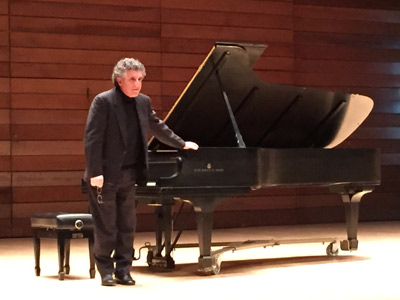On Friday evening, November 14, the Oregon Center for the Arts’ Tutunov Piano Series presented for its second concert of the season, pianist extraordinaire, Francesco Nicolosi, to a packed house at the SOU Music Recital Hall in Ashland. Nicolosi, 59 years old, born in Catania Italy and centered in Naples, is perhaps the most distinguished contemporary pianist of the Italian tradition and widely acknowledged as one of the foremost pianists of his generation. He has won more than a handful of competition prizes, played in the most famous concerts halls around the world, recorded for three famous record labels, and is a mainstay performer at a wide range of international music festivals, including: Festival dei Due Mondi in Spoleto, Rossini Opera Festival, Ravenna Festival, Festival di Ravello, Festival Pianistico Internazionale di Brescia e Bergamo, Taormina Teatro Musica, Settimane Musicali in Stresa, Estate Musicale Sorrentina, Settembre Musica in Torino, Leuciana Festival, Marathon Internacional in Sevilla, Festival de Musique in Menton, Rencontres Musicales en Artois, Weimar Kunstfest, Budapest Liszt Festival, and many others. His concert tour, before and after his Ashland appearance, had/has him performing in Saint Petersburg, Russia; Tivoli (Rome); Vancouver, Canada; Seattle, WA; Rome again, and his 2014 finale in Gstaad, Switzerland. To say the least, it is astonishing and incredible that Ashland, OR would be a stop on that tour of distinguished concert venues. We have our own resident piano virtuoso, international concert pianist and Southern Oregon University Music Professor, Alexander Tutunov, to thank for that exceptional privilege. Tutunov asks, and great pianists come to play here.
Nicolosi is not your typical concert pianist and the concert he presented to his Ashland audience was not the typical classical piano concert. As already noted, he is the preeminent contemporary pianist of the Italian tradition. As such he is an unrivaled interpreter of compositions by Italian composers. He began this concert with impressive performances of two compositions, rarely heard here, by Italian composer Domenico Scarlatti: Sonata in C Major, “Pastorale” and Sonata in G Major. Then he thrilled the audience with an exemplary performance of the more familiar Mozart Sonata in F Major.
After an intermission, things really began to get interesting. Nicolosi is the only recognized interpreter in the world today of the music of the legendary Austrian pianist, Sigismond Thalberg. Thalberg was one of the most distinguished virtuoso pianists of the 19th century. Thalberg toured Europe extensively as a concert pianist, and what he played in those concert performances were his own compositions, primarily fantasias fashioned from opera themes. Because opera was the most popular live music experience of his era, the themes from popular operas assimilated into his fantasias were recognizable to and appreciated by his knowledgeable audiences. And many of the operas Thalberg drew from were written by, guess what? Italian composers. So Thalberg produced truly unique compositions for the piano, drawn from Italian operas. And nobody else in the world plays them now, except Nicolosi. During his introductory comments, Tutunov confessed that he had once asked Nicolosi why no one else seemed to be able to play Thalberg’s compositions. And Nicolosi had responded that the key to playing Thalberg was that you really had to know, understand and feel opera. Of course, who better to grasp and master challenging opera themed piano compositions than a born and bred Italian piano virtuoso.
The second half of this concert commenced with two delightful Thalberg fantasias for piano, based on Italian operas: The first Art du chant appliquè au piano was drawn from a Quartet in the Bellini opera, I Puritani. The second was Souvenir of “Un Ballo in Maschera” by Verdi. Both pieces were dramatic, like the operas they were drawn from, while displaying exceptional keyboard virtuosity. You didn’t HAVE to be an opera fan to appreciate Nicolosi’s impressive performances of these striking and challenging pieces. But if you happened to be familiar with the operas, as Thalberg’s audiences were, then the pieces were even more enjoyable.
Impossible as it may sound, Nicolosi saved the best for last. The final piece on this concert program was the often played Liszt Rhapsodie Espangnole. Every pianist worth his salt plays this piece. But Nicolosi plays it with a unique and interesting twist. It happens that Liszt wrote an alternate ending for his Rhapsodie Espangnole. Nicolosi found the score for the alternate ending and is the only pianist who plays the alternate ending; all the others play the standard ending. No matter how many times you may have heard Liszt’s Rhapsodie Espangnole performed, either live in concert, or on recording, you’ve always heard the standard ending and never heard Liszt’s alternate ending. Unless you heard it played at a Nicolosi concert like the audience in the Music Recital Hall on November 14. Or until right now! A common feature of many of my concert reviews is a short excerpt recording of a snippet of a piece performed during the concert.
Last minute excerpt of Franz Liszt’s Rhapsodie Espangnole, performed by Francesco Nicolosi, at Tutunov Piano Series Concert II on Nov. 14, 2014 at SOU Music Recital Hall, Ashland, OR.
The Music Recital Hall audience may not have realized they had just heard a historic performance, but they did appreciate that they had heard virtuoso piano playing of rare quality, and responded with a sustained, thunderous, standing ovation. Nicolosi, who clearly enjoys playing the piano for audiences, accommodated the appreciative audience and their extended display of approval, by returning not once, or even twice, but THREE times to the piano for encores, including several more pieces from Italian operas, by Verdi and Bellini. If the audience couldn’t get enough virtuoso piano playing in the Italian tradition from Nicolosi, he in turn was willing to give them more.
People from bigger metropolises, like San Francisco, Los Angeles, New York, Chicago, or Boston can brag proudly about the variety and quality of the performing arts offerings available to them. But none of them have been as lucky as the Ashland Tutunov Concert Series audience, to have the opportunity to enjoy a performance by international piano sensation, Francesco Nicolosi, and to hear rarely performed remarkable pieces by Scarlotti and Thalberg, and the even rarer alternate ending to Liszt’s Rhapsodie Espangnole. It pays to live in the Rogue Valley, where we share opportunities to savor unique and historical concert performances with audiences in concert venues like St. Petersburg, Rome, Vancouver, Seattle and Gstaad.
So don’t miss the next opportunity to attend an exceptional Tutunov Piano Series Concert, featuring a piano duo performed by Ivona Kaminska and Christopher Bowlby of works by Chopin, Schumann, Liszt, Debussy, Junkinsmith and Milhaud. Feb. 6, 7:30pm at SOU Music Recital Hall, Ashland. Get tickets: online at http://bit.ly/1F6QIH4, or by calling the box office at 541-552-6348, or in person at the box office in the lobby of the SOU Music Recital Hall on South Mountain Av. in Ashland, OR.

 Lee Greene was born & raised in a NJ family where the only religion worshipped was classical music, Leonard Bernstein was God, and the radio was constantly on and tuned to classical station WQXR (which is now always on in his Jacksonville home thanks to the miracle of the Internet). Growing up in the New York City metropolitan area and later while residing and practicing law in NYC, Lee attended oodles of Broadway and off-Broadway theater productions, as well as concerts and opera at Lincoln Center, Carnegie Hall and other NYC venues. Lee is now a retired attorney, runs a computer support business, and has served on the boards of Rogue Opera & Siskiyou Violins. Lee also writes Performing Arts reviews published on the website,
Lee Greene was born & raised in a NJ family where the only religion worshipped was classical music, Leonard Bernstein was God, and the radio was constantly on and tuned to classical station WQXR (which is now always on in his Jacksonville home thanks to the miracle of the Internet). Growing up in the New York City metropolitan area and later while residing and practicing law in NYC, Lee attended oodles of Broadway and off-Broadway theater productions, as well as concerts and opera at Lincoln Center, Carnegie Hall and other NYC venues. Lee is now a retired attorney, runs a computer support business, and has served on the boards of Rogue Opera & Siskiyou Violins. Lee also writes Performing Arts reviews published on the website,